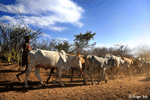Biodiversity and coherence in EU Common Agricultural Policy
Published on Wed, 2012-06-27 15:22
Professor Mirjam Van Reisen, director of Europe External Policy Advisors, insisted on the “urgency of the question of the coherence of the EU Common Agricultural Policy (CAP)” that remains unanswered, though the only solution to combine fair development, climate change curbing and biodiversity preservation should take place at the global scale. It is important to promote biodiversity as a livelihood issue and that answers to the current climate crisis should be found in collaboration with local farmers, she warned other experts and members of the European Parliament (MEPs) who met at the Strasbourg. The meeting held ahead of the Rio2012 conference aimed at sharing views on the ability of the CAP to adapt to the challenges of climate change while respecting the environment and the life and livelihoods in developing countries, with the objective to propose concrete measures on the CAP in stronger coherence with environmental goals, such as targeting biodiversity. All experts emphasized the importance of implementing a better knowledge-sharing system between EU and developing countries on agricultural and sustainability issues. Maria Witmer, from The Netherlands Environmental Assessment Agency (PBL) told the assembly that reforming the CAP should go with the adoption of a “global vision” in which exchanges of best practices would be central. This global vision would help “to promote sustainable agriculture even in developing countries” as an answer to climate and development challenges. Panellists also stressed that the transition to a more sustainable CAP would only be achieved through closer bounds between agricultural and development policies at the European level. Joep Van Mierlo, from Vétérinaires sans Frontières (Veterinaries without Borders) argued that the CAP could tackle climate change by “pro-actively subsidising” traditional farming practices, more respectful of the environment, and urged MEPs to “take into account the externality of the CAP through the Policy for Development principle”. In addition, taking the example of pastoralists in drylands, Ced Hesse, from the International Institute for Environment and Development, insisted on the necessity for a global and sustainable agricultural policy “to fit into ecological dynamics” and respect the natural cycles. The host of the meeting, the European People’s Party MEP Birgit Schnieber-Jastram, explained that the “insights of the experts were very valuable”. She stressed that improvements to the CAP reform could still be made “regarding possible modulation of funds from the first to the second pillar” and in the fields of “knowledge-sharing and cooperation in research and development” for developing countries. She also emphasized the “Rio2012 context” to make progress on the CAP issue. Members of the European Parliament are demanding that the reform of the CAP will take into account the global environmental challenges and climate change. Therefore, in the run up to Rio2012, held last week in Brazil, they invite experts to participate in a hearing on biodiversity and coherence in the CAP reform. Currently, the new CAP is being discussed by the European Parliament and should be implemented starting from 2014. Giving her explicit support to the greening of the CAP, MEP Schniebler-Jastram expresses her concern about the effects of the CAP in developing countries. She observes that "from the perspective of development policy, one could suggest an entirely different CAP than that presented in the reform proposals by the European Commission." "The reformed CAP continues to have external effects which are not sufficiently reflected in the European Commission proposals. Therefore, the CAP regulations must be carefully checked in the light of the Treaty obligation to ensure Policy Coherence for Development (PCD) (Article 208 TFEU)," stated Schnieber-Jastram. She added that "in the light of a broader understanding of PCD which goes beyond 'do no harm', some elements of the second pillar, more particular the EU foreign policy, could help create synergies and enhance cooperation between farmers in Europe and the developing world."
Small-scale livestock farming matters "The new CAP should not be treated as an internal policy of the EU, because it has an impact outside Europe and more precisely on development countries," states Joep van Mierlo, director of Vétérinaires Sans Frontières Belgium, member organization of the Coalition of European Lobbies for Eastern African Pastoralism (CELEP). "A reformed CAP should pay more attention to small-scale livestock keeping, as an important economic, social and environmental factor for the development of countries in the South. Over one billion people who live in chronic hunger and poverty depend on animals to provide essential nutrition and livelihoods. Neglecting these populations is neglecting humankind. Moreover, livestock keepers in Europe and the developing world are faced with common challenges, like climate change, access to markets and price volatility." Sources
|
SUSCRIBE TO OUR NEWSLETTER



